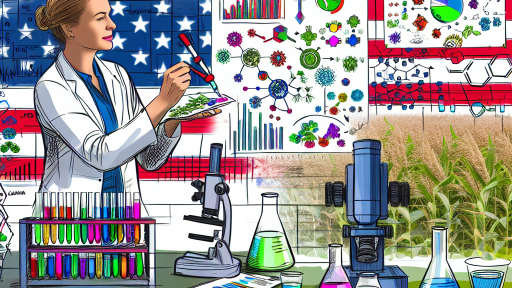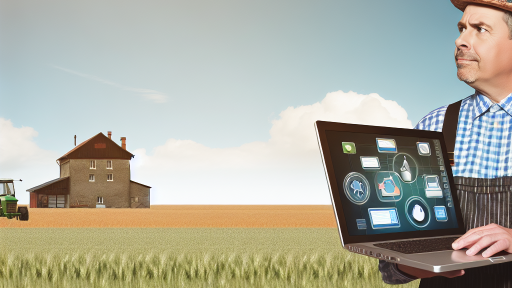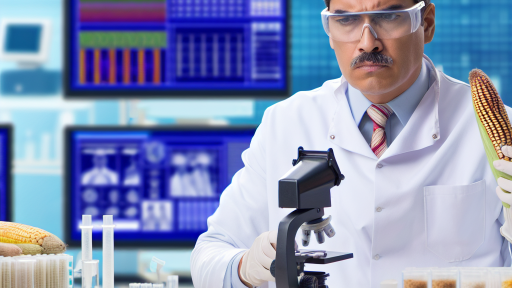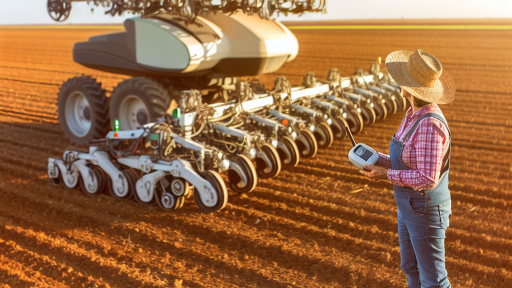Introduction to Smart Farming and the Role of IoT in Agriculture
Smart farming revolutionizes traditional agricultural practices.
It integrates advanced technologies for efficiency and sustainability.
Internet of Things (IoT) plays a crucial role in this transformation.
IoT connects devices, enabling real-time data collection and analysis.
Understanding Smart Farming
Smart farming uses technology to enhance crop yield and efficiency.
It leverages data-driven decision-making processes.
This approach improves resource management and reduces waste.
Farmers gain precise insights into soil conditions, weather patterns, and crop health.
The Significance of IoT in Agriculture
IoT devices create a network of connected sensors and machines.
They monitor environmental variables like temperature and humidity.
Data from these devices enables farmers to make informed adjustments.
This proactive management leads to better crop management and productivity.
Enhanced Efficiency and Sustainability
Smart farming increases operational efficiency through automation.
Automation reduces labor costs and minimizes human errors.
Moreover, it promotes sustainable practices by optimizing resource use.
Transform Your Agribusiness
Unlock your farm's potential with expert advice tailored to your needs. Get actionable steps that drive real results.
Get StartedThis results in less water consumption and reduced chemical applications.
The Future of Agriculture with IoT
The future of agriculture lies in the widespread adoption of IoT technologies.
As technology advances, smart farming continues to evolve.
Eventually, farmers will rely more on data-driven solutions.
This shift promises to make agriculture more resilient and productive.
Overview of IoT Technologies in Agriculture
Sensors
Sensors play a vital role in modern agriculture.
They collect data on soil moisture, nutrient levels, and temperature.
Farmers use these insights to optimize irrigation and fertilization.
Consequently, crop yields improve while resource use decreases.
Drones
Drones revolutionize crop monitoring and assessment.
They provide real-time aerial imagery of fields.
This allows farmers to identify pest infestations and crop diseases early.
Consequently, timely interventions can significantly reduce losses.
Data Analytics
Data analytics transforms raw information into actionable insights.
Farmers analyze collected data to make informed decisions.
For instance, they predict weather patterns and optimize planting schedules.
As a result, agricultural efficiency and sustainability improve.
Benefits of Smart Farming
Increased Efficiency
Smart farming enhances efficiency in agricultural practices.
IoT devices facilitate real-time monitoring of crops.
This technology allows farmers to make informed decisions quickly.
As a result, resources are utilized more effectively.
Automated irrigation systems conserve water and energy.
Moreover, precision farming reduces waste significantly.
Farmers can optimize their processes through data analytics.
Showcase Your Farming Business
Publish your professional farming services profile on our blog for a one-time fee of $200 and reach a dedicated audience of farmers and agribusiness owners.
Publish Your ProfileImproved Crop Yields
Smart farming practices lead to higher crop yields.
Utilizing sensors helps track soil health accurately.
This monitoring includes temperature, moisture, and nutrient levels.
Consequently, farmers can apply fertilizers more effectively.
Furthermore, IoT technology supports pest detection.
By identifying pests early, crop losses are minimized.
Ultimately, enhanced yields contribute to food security.
Farmers benefit economically from increased production as well.
You Might Also Like: How Blockchain Enhances Traceability In Agricultural Supply Chains
Sustainable Practices Enabled by IoT
Water Conservation
Water conservation is critical for sustainable agriculture.
IoT technology monitors soil moisture levels in real-time.
Farmers can make data-driven decisions on irrigation schedules.
This reduces water wastage significantly.
Smart sensors notify farmers when to water crops adequately.
Additionally, IoT devices help in identifying how much water is needed.
This precision minimizes excess water usage.
Consequently, crops receive adequate moisture consistently.
Irrigation systems can be automated using IoT solutions.
This automation optimizes water distribution across the fields.
Farmers can also use weather data to plan irrigation better.
In turn, this adaptive strategy enhances crop yields.
Soil Management
Soil health is vital for sustainable farming practices.
IoT sensors assess soil conditions continuously.
They measure parameters like pH levels and nutrient content.
Farmers gain insights into soil health through this data.
Such insights guide them in applying fertilizers effectively.
Furthermore, IoT technology helps in identifying soil erosion risks.
This information allows for proactive measures to prevent degradation.
Consequently, soil quality improves over time.
Farmers can monitor their fields from anywhere using mobile apps.
This connectivity fosters immediate responses to changing conditions.
Ultimately, smart farming enhances overall agricultural sustainability.
Uncover the Details: Controlled Environment Agriculture Trends Every Farmer Should Know
Challenges and Barriers to Implementing IoT in Agriculture
High Initial Costs
Implementing IoT solutions in agriculture often requires significant financial investment.
This includes costs for hardware, software, and ongoing maintenance.
Many small farmers struggle to afford such expenditures.
Additionally, there are expenses related to training personnel on new technologies.
Limited Infrastructure
Rural areas frequently lack the necessary infrastructure for IoT deployment.
Reliable internet connectivity is essential for real-time data collection.
Moreover, many agricultural regions are located far from cell towers.
Showcase Your Farming Business
Publish your professional farming services profile on our blog for a one-time fee of $200 and reach a dedicated audience of farmers and agribusiness owners.
Publish Your ProfileThis limitation can hinder the performance of IoT devices.
Data Privacy and Security Concerns
Data security remains a major concern when implementing IoT in agriculture.
Farmers worry about unauthorized access to sensitive information.
Moreover, concerns about data misuse may prevent some from adopting these technologies.
Resistance to Change
Many farmers are accustomed to traditional farming methods.
Integrating IoT technologies requires a shift in mindset and operational practices.
This resistance can delay or prevent adoption altogether.
Lack of Technical Knowledge
Operating IoT systems requires a certain level of technical expertise.
Many farmers may not feel confident in using advanced technology.
This can lead to underutilization of IoT tools that could enhance productivity.
Uncertain Return on Investment
Farmers often need clarity on the potential returns from IoT investments.
Without clear profit margins, they may hesitate to invest in new technologies.
Furthermore, the long-term benefits may take time to realize.
Regulatory Challenges
Navigating regulations can be complex when implementing IoT solutions.
Farmers might face compliance issues related to data handling and usage.
These complexities can create an additional hurdle in adopting IoT technologies.
Gain More Insights: Top Sensor Technologies for Sustainable Agriculture
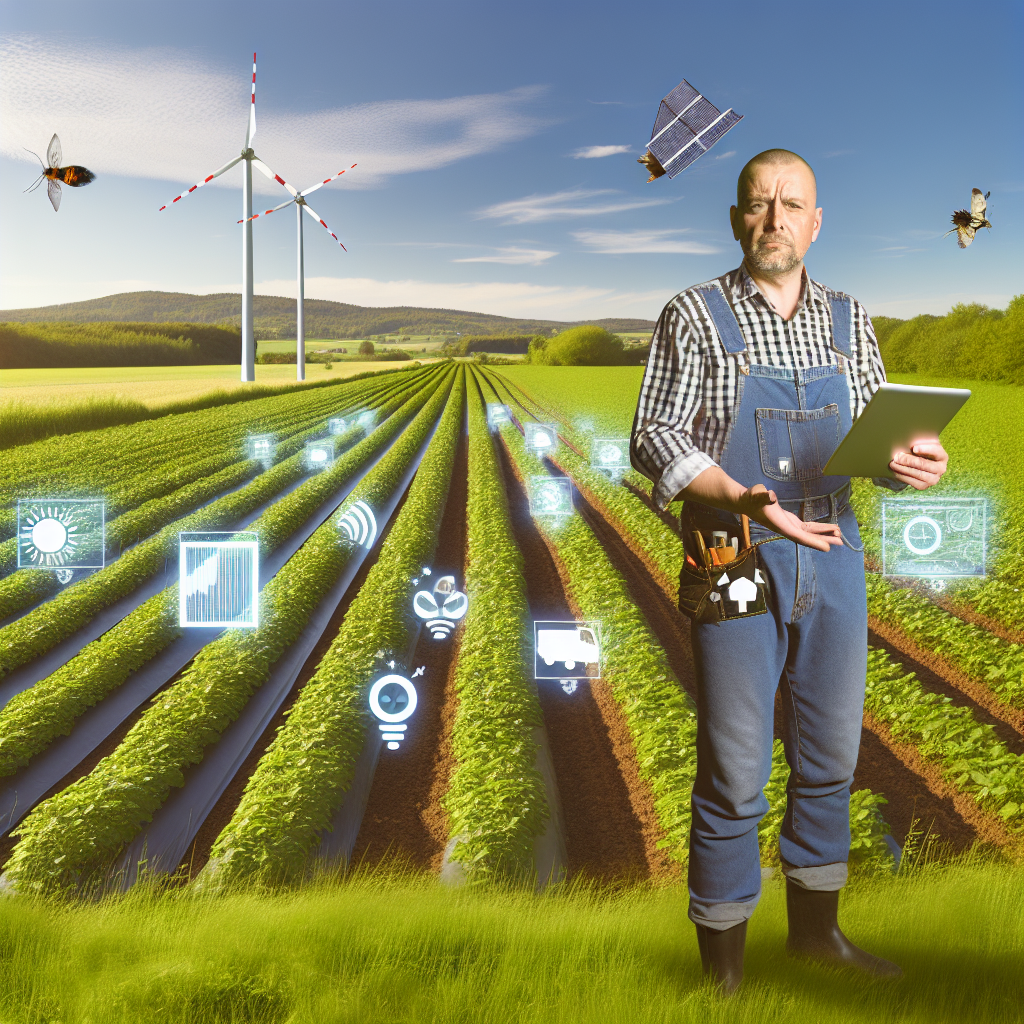
Case Studies: Successful IoT Implementations in Sustainable Farming
Precision Agriculture at GreenFields Farm
GreenFields Farm adopted IoT technology to enhance crop management.
They integrated sensors to monitor soil moisture and pH levels.
This data enabled timely irrigation and fertilization adjustments.
As a result, GreenFields increased yield by 30% over two seasons.
Additionally, they reduced water usage by 40% using smart irrigation systems.
Livestock Monitoring at Happy Hooves Ranch
Happy Hooves Ranch utilized IoT devices for livestock health monitoring.
Sensors tracked vital signs and activity levels of the animals.
Farmers received real-time alerts for any health issues.
This approach decreased overall veterinary costs significantly.
Furthermore, the ranch reported improved animal welfare and productivity.
Vertical Farming Innovations by Urban Greens
Urban Greens implemented IoT technology in their vertical farming operations.
They used automated systems to regulate light and nutrients.
This automation led to a 50% increase in crop yield within the same space.
Moreover, energy consumption decreased by 30% through optimized resource use.
Urban Greens serves as a model for urban agriculture’s future potential.
Sustainable Pest Management at EcoHarvest Organics
EcoHarvest Organics developed a smart pest management system.
Data from IoT devices guided pest control decisions in real-time.
This approach minimized chemical pesticide use by 70%.
Additionally, farmers achieved higher crop quality without compromising sustainability.
Such innovations illustrate the possibilities of responsible pest management.
Delve into the Subject: Comprehensive Agri-Fintech Overview Of Digital Payment Solutions For Farmers
The Future of Smart Farming: Predictions and Emerging Technologies
Innovative Agricultural Practices
Smart farming integrates advanced technologies in agriculture.
Farmers use IoT devices to enhance crop yields.
Showcase Your Farming Business
Publish your professional farming services profile on our blog for a one-time fee of $200 and reach a dedicated audience of farmers and agribusiness owners.
Publish Your ProfileThis technology enables real-time monitoring of plant health.
Data-driven decisions lead to better resource management.
As a result, farmers reduce waste and improve efficiency.
Emerging IoT Technologies
Several IoT technologies are shaping the future of agriculture.
Drone technology allows for aerial crop monitoring.
Sensors provide vital information about soil conditions.
Additionally, livestock tracking systems improve animal welfare.
These innovations foster sustainable farming practices.
Impact on Crop Management
IoT solutions enhance precision farming techniques.
Farmers can remotely control irrigation systems.
This capability optimizes water usage and increases yields.
Moreover, real-time data helps farmers detect pests early.
As a result, they can reduce pesticide usage effectively.
Collaboration and Data Sharing
Collaboration among farmers promotes data sharing across platforms.
Farms can compare results and improve practices together.
This networked approach accelerates innovation in agriculture.
Furthermore, shared data enhances everyone’s decision-making process.
Ultimately, collaboration strengthens community resilience.
Challenges and Considerations
Despite promising technologies, challenges remain in smart farming.
Data privacy and security are significant concerns.
Farmers need to understand how to protect their information.
Moreover, technical knowledge varies among agricultural stakeholders.
Training programs will be crucial for widespread adoption.
The Path Forward
Investing in smart farming technologies will drive agricultural progress.
Governments should support initiatives to enhance IoT access.
Ultimately, smart farming is crucial for sustainable food production.
With the right policies, agricultural practices can evolve positively.
The future of farming promises increased efficiency and sustainability.
Policy and Regulatory Considerations for IoT in Agriculture
Current Regulatory Landscape
The integration of IoT in agriculture faces various regulatory challenges.
Governments are increasingly focusing on data privacy and security regulations.
Moreover, compliance with environmental sustainability standards is essential.
Additionally, sector-specific regulations must be adhered to for safe operations.
Data Privacy and Security Regulations
Data privacy remains a critical issue for IoT in agriculture.
Farmers must safeguard personal data collected from IoT devices.
This includes protecting agricultural workers’ data from unauthorized access.
Implementing robust cybersecurity measures is crucial for safeguarding sensitive information.
Environmental Policies
Environmental policies play a significant role in IoT deployment.
Agricultural practices must comply with local and international environmental regulations.
For instance, IoT technologies should minimize water usage and chemical runoff.
Farmers can leverage IoT for precise resource management, thus adhering to green policies.
Showcase Your Farming Business
Publish your professional farming services profile on our blog for a one-time fee of $200 and reach a dedicated audience of farmers and agribusiness owners.
Publish Your ProfileFunding and Support Programs
Governments offer various funding programs to support IoT in agriculture.
These initiatives aim to promote innovative technologies for sustainable farming.
Farmers can access grants and loans for adopting IoT solutions.
Furthermore, public-private partnerships can enhance technology transfer in agriculture.
Future Regulatory Trends
The regulatory landscape for IoT in agriculture is ever-evolving.
Expect increased focus on standardization to ensure interoperability.
Technological advancements will drive new regulations for emerging IoT technologies.
Stakeholder engagement is vital to shape policies that support innovation.

